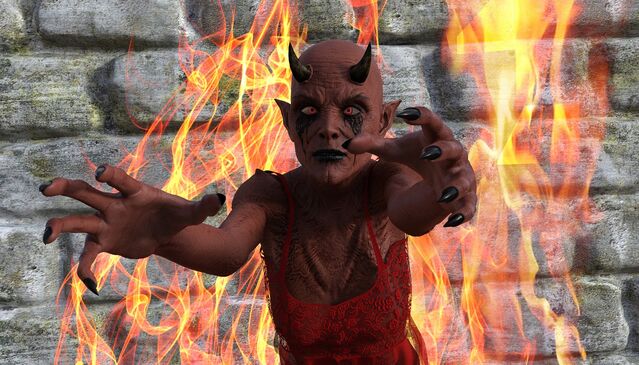Friends
The Devil Made Me Do It
Oh did he? How convenient. Whatever happened to accountability?
Posted July 30, 2020

A friend of mine owns a record company in Europe that specializes in American popular music from the 1950s and '60s—stuff like early rock and roll, rhythm and blues, and hillbilly music.1 I've worked with them as a producer for the past 30 years or so and it's a really fun gig, allowing me to dig into the music that I loved as a kid, sometimes getting to know the artists and musicians who created the music.
Recently, I was asked to write some notes for a collection of songs about the Devil. I knew there’d be no shortage of songs to choose from, ranging from 1920s blues through classic rock like the Rolling Stones' “Sympathy for the Devil " (1968).
Some of these songs take the whole Devil business very seriously and offer stern warnings to stop your evil ways, or you’ll go straight to Hell. The Louvin Brothers “Satan is Real” is a fine example from 1959, as is Chuck Berry’s riveting 1956 track, “The Downbound Train.” Others treat the Devil like a metaphor and often make negative judgments about somebody’s behavior, which they attribute directly to the Devil.
A typical sentiment is, "When I met you I thought you were an angel, but I soon found out I was wrong.” These songs usually allow for no middle ground. If she ain't an angel, there’s only one other possibility. [For those of you who enjoy the musical references, I’ve included some more at the end of the article.]
It’s one thing to say, “You act as if you had the devil in you.” Many songs take it only to that point—using the Devil as a simile or metaphor. But for readers of Psychology Today, we should consider those instances that go further—in which the Devil is actually used to explain why that bad behavior occurred. In those cases we’ve gone from religion to psychology: we’re not only describing behavior; we’re explaining it.
Back in the 1960s and ‘70s, a hugely successful comedian named Flip Wilson turned "the Devil made me do it” into a meme. Wilson made frequent TV appearances in the 1960s before starring on his own Emmy Award-winning network TV show in 1970.2 He also made a slew of comedy albums, if you can remember what those were.
Wilson would do something outrageous in plain sight, then grin into the camera and say, “The Devil made me do it.” The audience would howl because everyone was in on the joke. We all knew that Flip was exploiting a bit of theology to avoid taking responsibility for his bad behavior. All you had to do was say, "The Devil made me do it,” and you got off the hook with your parents, your boss, your teacher, or your partner. It was a “Get out of Jail Free” card and Flip used it week after week.
The difference is, it was absurdist comedy when Flip did it. But not everyone is kidding about this.
No matter how you slice it, there's not a lot of difference between the view of human behavior expressed in many of these songs, as well as in Flip’s comedy, and the medieval idea of demonic possession. As long as we can blame the Devil for our worst behavior, or somebody else’s for that matter, nobody has to take any responsibility. Admittedly, it's a fair distance between a husband getting drunk and having a one-night stand, and the head-turning, telekinetic stunts Linda Blair pulled in The Exorcist. But when you get right down to it, they come from the same place: an external agent of evil who has taken control of us.
Wilson's routine got us all to laugh at the idea that someone could acknowledge that they had done something terrible, but dodge responsibility by making a theological claim. Whether the subject had robbed a bank, cheated on his wife, or played hooky from school and gone joyriding with his friends, it was all the same. It wasn’t his fault because—all together now—“the Devil made me do it.”3
This kind of devil-based theology includes an important but unstated message: When I'm a good boy (or girl), you can attribute my good acts directly to me and my sterling character. But if I behave in horrible, irresponsible ways, just blame it on the Devil, who is running the show.
We should be clear that this system isn’t symmetrical: When somebody engages in wonderful, kind, or generous behavior, we don’t talk about possession. How many times have you heard about Angelic possession as an explanation of anyone’s good behavior? Good acts, it seems, come from us. Bad acts, on the other hand, are externally imposed on us. People who act badly can claim (as Flip Wilson did) “I do not take responsibility for my actions and neither should you hold me accountable.”
Why is this? If we are building a theological system of behavior, shouldn't it work both ways?
In the course of my work for the record company, I became very close friends with a singer named Jeanie Greene who worked as a backup session vocalist.4 Her angelic voice and soulful stylings had graced records by Elvis, George Harrison, Percy Sledge, Willie Nelson, and others.
Jeanie grew up in Mississippi and I in New York. We knew there were large cultural differences between us but we really enjoyed each other’s company and spent hours talking on the phone. One day, however, we came close to the edge. I said something, frivolously, about the Devil and Jeanie immediately responded, "Don't joke about that. You know he's real. He walks among us. His best weapon is your disbelief.” She probably reeled off a few other aphorisms but her point was made and we had two choices: We could get into an endless theological debate that would consume our friendship, or we could value our friendship above all and avoid religion. Thankfully, we chose the latter.
Don't get me wrong: I can write you a song about the Devil and I can sing one, and I have done both.5 But that's a long way from wondering if the guy sitting across from me on the train, holding a backpack, might be the Devil. How do people maintain beliefs like this? What function do they serve?
I understand that Flip Wilson was right. They'll get you off the hook. When I've done something I'm ashamed of, wouldn't it be nice to point across the room and say that guy there, he made me do it. It's him. He took control of me. There was no “me” involved in that heinous act you’re accusing me of. But how different is this from one sibling telling Mommy that it was his brother who actually broke the dish when she was out of the room?
The Devil seen in those terms is like a magic cloak, allowing you to abdicate all accountability. Who wouldn't like a deal like that? But there is a bigger cost to placing responsibility on a horned, pitchforked character who “walks among us.” That cost comes in terms of honor and mental health.
Isn't it better to say: "I did it. I'm not proud of it, but I did it. Me." The motivation probably comes from a deep, perhaps barely explored part of my own psyche, but it is me. Not some imaginary being that lets me squirm away from accountability and self-exploration.
Some More Musical Examples: In 1956 an R&B doo-wop group called the Clovers enjoyed a hit record called "Devil or Angel." The song enjoyed the second round of popularity in 1960 when Bobby Vee recorded it. And of course, Elvis sang "The Devil in Disguise" (a #3 hit in 1963) and Marty Robbins took "Devil Woman" to the upper regions of the pop charts in 1962.
Thanks to Yana Hoffman and Drs. Scott Parker and Doug Reberg.
References
1. Bear Family Records: 40 Years. Box set 4 CDs + 308 pg book. BCD 17050
3. A Dutch rock group called Golden Earring even recorded a song in 1983 called “The Devil Made Me Do It” which contains the lyrics: “the Devil made me do it/It was the act of a man possessed/Yeah, the Devil made me do it/Your Honor, I am innocent”
4. Jeanie Greene http://badcatrecords.com/BadCat/GREENEjeanie.htm
5. Hank Davis – One Way Track (38 track CD). Bear Family Records (Germany) BCD 17319
Whitburn, J. (1987). Top Pop Singles 1955-1986. Wisconsin: Record Research Inc.




